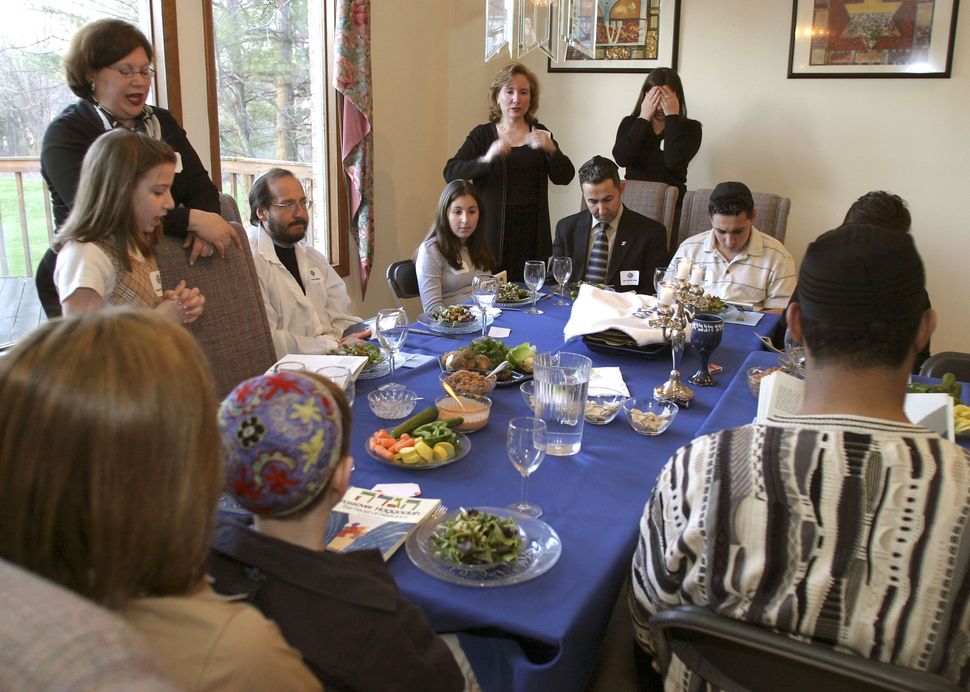How to Host A Passover Seder Even Your Non-Jewish Friends Will Enjoy

Image by Getty Images
Passover is one of my favorite times of the year, and not just because of the rich tradition that celebrates our ancestors’ freedom from Egyptian slavery. My family has always used this time to introduce our non-Jewish friends to the culture and heritage that fills us with pride.
With over 20 years in the event planning industry, I love nothing more than to throw a party or gathering that everyone enjoys and talks about for weeks to come. For me, the Passover Seder is no different.
Hosting non-Jewish guests for Passover can be pretty intimidating —- they don’t know the culture, traditions, language, or food, and it can be difficult to introduce those things in a way that doesn’t confuse people or turn them off.
But it can be done. Here are some tips for hosting a Passover Seder that all your guests will enjoy and appreciate:
Break the Ice with a Game—And Prizes
My husband, Allen, and I love to break the ice and loosen up all of our guests with a fun game of trivia. Allen spends a few hours the night before Passover writing out questions about ancient Jewish history, like:
• What is the Torah?
• What was Jacob’s new name after God changed it?
• What is the name of the food that God sent from the sky to feed the Israelites during their exodus from Egypt?
The questions are given in multiple choice format, and they aren’t meant to be too difficult to answer. In fact, I’ve been surprised by how many of my non-Jewish friends know the answers from their own study of the Bible or world religions. The questions get progressively difficult as the game continues, but we do offer each guest one lifeline. Anyone can ask another person at the table for help answering a question, or they can even call someone else not in attendance.
The person who answers the most questions right wins, and my husband loves to give prizes in the form of rare coins or $2 bills.
Consider Following a Children’s Seder
The Seder is the focal point of the Passover celebration, but it can be overwhelming for people who have never experienced it. For this reason, my husband and I follow a kids’ Seder to make the traditions easier to understand and follow.
To start, each person in attendance is given a kid-friendly haggadah that serves two primary purposes: It’s shorter, and all of the Hebrew words are listed with their English pronunciation so everyone can read along when it’s their turn. Allen and I actually still use the haggadahs that we purchased for my sons when they were young, and year after year I find that they are still great at explaining Jewish history and tradition while keeping everyone—both kids and adults—engaged.
Pass Out a Dinner Menu
My Passover dinner is the same every year: Hard-boiled egg sprinkled with salt water; gefilte fish with horseradish; chicken soup with matzo balls; brisket with tzimmes and potato kugel; and angel food cake and macaroons for dessert.
Everyone can recognize an egg and a slice of cake, but for the other foods, I think it’s important to give non-Jewish guests a full explanation of what they are and why they’re an important part of Jewish culture. I don’t serve hard-boiled eggs with a sprinkle of salt water just because it makes the egg taste better—it also represents the tears that my ancestors shed during slavery.
I’ve also found that when newcomers understand exactly why they’ve been served the food on their plates, they are more like to try new foods and, in many cases, really enjoy them, Ultimately, that’s what this celebration is all about—remembering and honoring the past, while inviting friends to share that experience with us.
Randi Lesnick is a top celebrity event and luxury wedding planner based in Music City and founder of Randi Events. Based in Nashville’s famed Music Row, Randi designs events around the world and has worked with top artists including Tim McGraw, Taylor Swift, and Florida Georgia Line. With over 20 years experience as a successful entrepreneur, Randi also serves as a virtual business mentor to women around the world.























